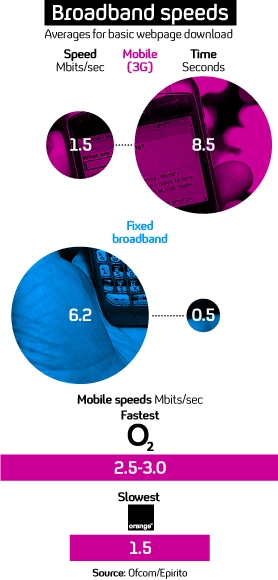Mobile broadband on the rise as O2 wins speed test
More of us are using 3G broadband than ever but Ofcom finds download speeds are still a lottery, even in cities. A mobile web expert tells Channel 4 News “overload” is a major problem.

Loading a web page via mobile broadband takes an average of 8.5 seconds which, according to a UK-wide study by Ofcom, is 17 times slower than a fixed internet connection.
The regulator, along with monitoring specialists Epitiro, carried out 4.2 million speed tests between September and December 2010. It found that 17 per cent of UK households get online via mobile broadband, with 7 per cent using it as their only internet access.
The study also looked at the performances of five mobile operators in areas of good 3G network coverage, using dongles and datacards, not smartphones.
People using the O2 network enjoyed the quickest downloads, with average speeds of 6.2 megabits per second. The next best were Vodafone, 3 and T-Mobile. The slowest was Orange, averaging below 1.5Mbits/sec.
See the full Ofcom report here: Measuring Mobile Broadband in the UK
A spokeswoman for Orange told Channel 4 News: “Our main concern is that Ofcom’s study only focused on dongles, which are only one part of a consumer’s mobile broadband experience and excludes the millions of users that access the internet through their 3G smart phones.
“Since this research was conducted six months ago, we’ve delivered significant improvements as part of ongoing investment in our network and we feel this significantly enhances our position.”
A spokesman from the top firm, O2, told Channel 4 News: “We’ve invested £10bn in infrastructure in the last decade and we continue to invest. At the same time, there is also a huge demand on operators to invest in the vast bulk of the network in cities to accommodate the massive explosion in the demand for data.
“So for the sake of the UK economy, we need to invest where it’s most efficient to do so.”
Your reaction on Facebook and Twitter:
@andy_s_64: My experience borne out by report. IPad on 3 whizzes along compared to iPhone with Orange - 3 coverage way better too...
Neil via Facebook: I have only mobile broadband, expensive and slow, and annoyingly resets/loses signal frequently.
@Audiogeist: Broadband? What broadband? Slooow...and my T-mobile 'fair usage' amount runs out mid month!
@The_News_Man: Amount of traffic, Network coverage & users in an area will determine your actual speed.
Clara Augusto Hernandez: Waste of time waiting for connection, have to be in an open location.
Add your voice via Facebook.com/Channel4News or via Twitter @channel4news
Expensive frequencies
The survey found that 3G coverage is still very unpredictable, with no guarantee of good performance in city centres.
Clare Hopping, group editor of Know Your Mobile, explained that overloaded frequencies could be to blame.
She told Channel 4 News: “If everyone in a highly populated area is using a network at once, there will be considerable pressure on the network to deliver web pages because they only have a certain capacity.
“There’s also the issue of networks sharing frequencies, meaning the frequencies can get overloaded too.”
She added: “There can be interruptions in networks, especially if you’re using it on the move and this can vastly increase the time it will take a page to load.”
Rival companies have to bid for these frequencies in auctions that have in the past run into the many billions. Earlier this year, Ofcom allowed O2 and Vodafone to operate on a wider number of frequencies, which explains their better coverage.
In the last auction for 3G frequencies, Vodafone bid £5.9bn and we can expect even higher figures at the next one. Operators will be invited to bid for a 4G network from 2012.
What is 3G?
3G stands for "third generation".
A 3G phone allows you to get online whle you're on the move - to check emails, look at a map or play games.
You need "coverage" to access a 3G network - this means your phone can pick up a mobile internet signal.
All the major networks have their own network, with some providing quicker connections than others.
The 1G system, introduced in 1981, was the first wireless telephone - sometimes referred to as the "brick".
Each new generation has brought with it new frequency bands, allowing faster data transfer to your phone.
The "bandwidth" of these frequencies means the difference between the upper and lower frequencies of a signal.
The amount of bandwidth needed for 3G services to work can be 500 times more than the 2G phones of the 1990s.
4G phones take things a step further offering super-fast download speeds.
4G LTE (Long Term Evolution) networks already operate in the US and will be trialled in the UK from September 2011.
-
Latest news
-
500 years of music: exhibition challenges when Black British music began5m

-
‘We’ve got to do more’, says World Food Programme’s Palestine Director3m

-
Palestinian president expects Israel will go into Rafah ‘in coming days’1m

-
Rishi Sunak refuses to rule out July general election, again3m

-
Local elections: every Dorset council seat is up for grabs6m

-




